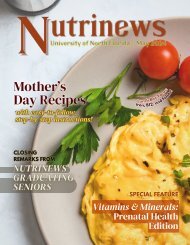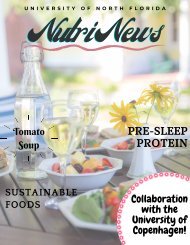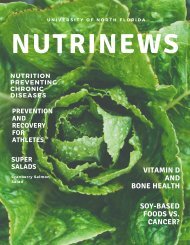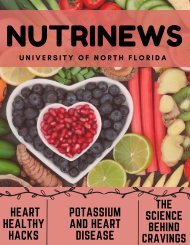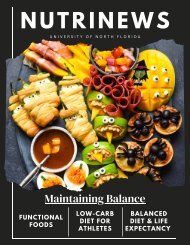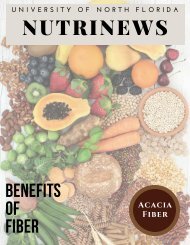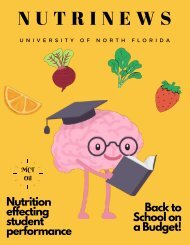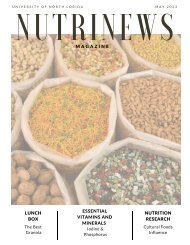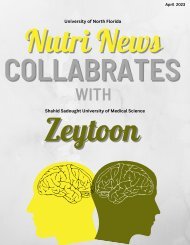April Issue
Hello Ospreys! This April issue features exciting updates on the 2021 spring graduation ceremony! We also highlight cauliflower in our Shopping in Season segment, Easy Ways to Move More and Sit Less and our Student Spotlight is on Mami Okada, who is a senior in the nutrition program. Happy reading and good luck with the rest of the semester!
Hello Ospreys!
This April issue features exciting updates on the 2021 spring graduation ceremony! We also highlight cauliflower in our Shopping in Season segment, Easy Ways to Move More and Sit Less and our Student Spotlight is on Mami Okada, who is a senior in the nutrition program.
Happy reading and good luck with the rest of the semester!
Create successful ePaper yourself
Turn your PDF publications into a flip-book with our unique Google optimized e-Paper software.
Camilleri et al. found that women who<br />
scored higher on the IE Scale-2 for eating<br />
based off of physical cues were<br />
associated with a lower energy intake<br />
overall. A higher “physical reasons” score<br />
was also associated with lower sweet and<br />
fatty food intake in both women and<br />
men, with women also consuming fewer<br />
dairy products, meat, fish, and eggs.<br />
There was also an association between a<br />
higher “cues” score (eating when you are<br />
psychically hungry, not emotionally<br />
hungry) and a lowered intake of dairy,<br />
meat, fish, and eggs in both sexes, and<br />
lowered whole grain intake in women.<br />
Additionally, it was found that higher<br />
permission scores were associated with<br />
higher energy intake and unhealthier<br />
food choices, including less fruit,<br />
vegetable, and whole-grain intake. From<br />
this data, Camilleri et al concluded that<br />
some dimensions of intuitive eating (like<br />
eating due to physical reasons and cues)<br />
are associated with healthier dietary<br />
intakes overall. They also found that the<br />
permission dimension was associated<br />
with unhealthier dietary intakes. They<br />
further concluded that it is important to<br />
develop strategies to foster eating in<br />
response to hunger and satiety signals, as<br />
they can be associated with healthier<br />
diets and greater health status from a<br />
public health perspective.<br />
Camilleri GM, Méjean C, Bellisle F, et al. Intuitive Eating Dimensions Were Differently Associated with Food Intake in<br />
the General Population-Based NutriNet-Santé Study. J Nutr. 2017;147(1):61-69. doi:10.3945/jn.116.234088<br />
5







